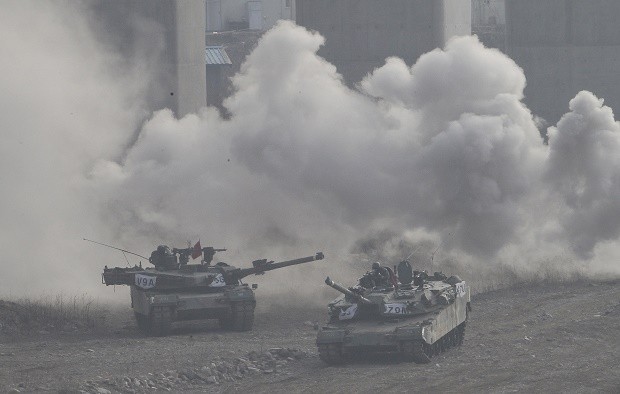North Korea says it’s readying nukes

South Korean army K-1 tanks move during an annual exercise in Yeoncheon, near the border with North Korea, Thursday, March 3, 2016. North Korea fired six short-range projectiles into the sea off its east coast Thursday, Seoul officials said, just hours after the UN Security Council approved the toughest sanctions on Pyongyang in two decades for its recent nuclear test and long-range rocket launch. AP
SEOUL, South Korea — North Korean leader Kim Jong-un has ordered his country’s nuclear weapons made ready for use at a moment’s notice, the official state news agency reported Friday.
Kim also said his country will ready its military so it is prepared to carry out pre-emptive attacks, calling the current situation very precarious, according to KCNA.
On Thursday, North Korea fired six short-range projectiles into the sea off its east coast, South Korean officials said, just hours after the UN Security Council approved the toughest sanctions on the North in two decades for its recent nuclear test and long-range rocket launch.
READ: North Korea fires short-range missiles after UN sanctions
The firings also came shortly after South Korea’s National Assembly passed its first legislation on human rights in North Korea.
The North Korean projectiles, fired from the eastern coastal town of Wonsan, flew about 100 to 150 kilometers (60 to 90 miles) before landing in the sea, South Korea’s Joint Chiefs of Staff said in a statement.
It wasn’t immediately known exactly what North Korea fired, and the projectiles could be missiles, artillery or rockets, South Korea’s Defense Ministry said.
North Korea routinely test-fires missiles and rockets, but often conducts weapons launches when angered at international condemnation.
Thursday’s firings were seen as a “low-level” response to the UN sanctions, with North Korea unlikely to launch any major provocation until its landmark ruling Workers’ Party convention in May, according to Yang Moo-jin, a professor at the University of North Korean Studies in Seoul.
READ: UN imposes toughest sanctions on N. Korea
North Korea has not issued an official reaction to the new UN sanctions. But citizens in its capital, Pyongyang, interviewed by The Associated Press said Thursday they believe their country can fight off any sanctions.
“No kind of sanctions will ever work on us, because we’ve lived under US sanctions for more than half a century,” said Pyongyang resident Song Hyo Il. “And in the future, we’re going to build a powerful and prosperous country here, relying on our own development.”
North Korean state media earlier warned that the imposition of new sanctions would be a “grave provocation” that shows “extreme” US hostility against the country. It said the sanctions would not result in the country’s collapse or prevent it from launching more rockets.
The UN sanctions include mandatory inspections of cargo leaving and entering North Korea by land, sea or air; a ban on all sales or transfers of small arms and light weapons to the North; and the expulsion of North Korean diplomats who engage in “illicit activities.”
In Beijing, Foreign Ministry spokesman Hong Lei said China, North Korea’s closest ally, hoped the UN sanctions would be implemented “comprehensively and seriously,” while harm to ordinary North Korean citizens would be avoided.
At the United Nations, Russia’s ambassador, Vitaly Churkin, asked about the North’s firing of short-range projectiles, said, “It means that they’re not drawing the proper conclusions yet.”
Japan’s UN ambassador, Motohide Yoshikawa, said, “That’s their way of reacting to what we have decided.”
“They may do something more,” Yoshikawa said. “So we will see.”
In January, North Korea conducted its fourth nuclear test, which it claimed was a hydrogen bomb. Last month, it put a satellite into orbit with a long-range rocket that the United Nations and others saw as a cover for a test of banned ballistic missile technology.
Just before the UN sanctions were unanimously adopted, South Korea’s National Assembly passed a bill that would establish a center tasked with collecting, archiving and publishing information about human rights in North Korea. It is required to transfer that information to the Justice Ministry, a step parliamentary officials say would provide legal grounds to punish rights violators in North Korea when the two Koreas eventually reunify.
North Korea, which views any criticism of its rights situation as part of a US-led plot to overthrow its government, had warned that enactment of the law would result in “miserable ruin.”
In 2014, a UN commission of inquiry on North Korea published a report laying out abuses such as a harsh system of political prison camps holding up to 120,000 people. The commission urged the Security Council to refer North Korea to the International Criminal Court over its human rights record.
READ: North Korea’s pachinko missiles














